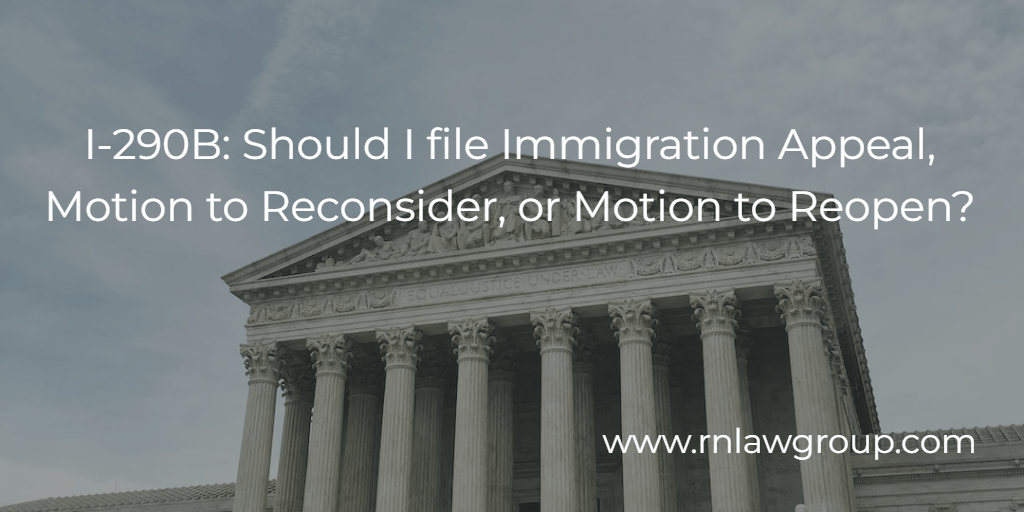
I-290B: Should I file Immigration Appeal, Motion to Reconsider, or Motion to Reopen?
One of the unfortunate realities of immigration law is confronting and maneuvering through the slings and arrows of outrageous fortune that USCIS can sometimes cast upon us as practitioners and immigrants. While we respect the fact that no entity operates at 100% efficiency or with unerring accuracy, the reality of immigration law is that we are sometimes faced with erroneous and often times truly absurd decisions from USCIS which puts aliens and their employers in unenviable positions. Sometimes these denials can be a misunderstanding or misapplication of policy, a misreading of fact, or what seems to be an increasing occurrence of late–errors so blatant and elementary that all we can do to save our sanity is laugh.
What can be done when USCIS does not do its job properly? There are a number of avenues available to formally or informally appeal a denial from USCIS. While litigation is always the strongest tool to combat arbitrary and capricious decisions from USCIS, options “outside the court room” are often limited to three realms:
- File an I-290B: Appeal, Motion to Reconsider, or Motion to Reopen;
- Re-filing the Immigration petition or application; and/or
- Ombudsman Request for Case Assistance
When faced with a denial decision, typically an individual or employer has 30 days to file an I-290B, Notice of Appeal or Motion. Upon receive of the denial, It is important to carefully review the specific reasons for denial provided by USCIS and choose the appropriate option (appeal, motion to reconsider, or motion to reopen) based on the circumstances of your case.
When filing the I-290B, one will select whether they are filing an appeal, motion to reconsider, or motion to reopen. Typically, when filing an Appeal the case will go before the Administrative Appeals Office (AAO). When before the AAO, we are requesting a higher appellate body review USCIS’ decision; if the AAO agrees with the appeal they will order USCIS to reverse its decision and typically approve the case.
If foregoing an appeal, one may file a Motion to Reconsider. A Motion to Reconsider is a request to the USCIS to review and reconsider its decision based on new evidence or legal arguments that were not previously considered and should be filed where you have new, relevant information that could affect the outcome of the case, or if there was a clear legal error in the initial decision. It is important to note that a motion to reconsider is not intended for presenting the same evidence and arguments that were already considered in the original decision.
Finally, within the realm of the I-290B we are left with the Motion to Reopen. A Motion to reopen is similar to a Motion to Reconsider but is generally filed when there is new evidence that was not available at the time of the initial decision. This could include new documents or information that could impact the case positively. It should be noted that like a Motion to Reconsider, a Motion to Reopen is not meant for re-arguing the same points that were already considered.
Whether filing an Appeal, Motion to Reconsider, or Motion to Reopen, it will typically take a number of months to sometimes more than a year to get a decision from USCIS. Often times—and while it may seem counter intuitive—it is often better to just re-file the immigration case with USCIS rather than filing the appeal. Typically, “re-filing” fees are less than or about equal to the appeal fees and you get a “second bite at the cherry”. USCIS typically has no clue about the first case/denial. When refiling a case, you typically get an answer within a few months rather than what can be ages with an I-290B. All things considered, it’s often the path of least resistance to just simply re-file the case.
Finally, an option of last resort is filing an Form 7004 with the USCIS Ombudsman. This is often useful in cases of improper rejection due to clear errors of fact or obvious misapplication of the relevant law by USCIS. Another avenue where the Ombudsman is useful is in instances of systemic issues that should be given higher level review.
For more information, or for a detailed conversation regarding your specific denial issues, the I-290B filing process, or other potential issues arising during your Permanent Residency Process or the immigration processes of your employees, please schedule a time to speak here.
By Ryan A. Wilck, Partner and Attorney at Law
Ryan Wilck is a Managing Partner and attorney at Reddy Neumann Brown PC with over a decade of US immigration law experience, enthusiastic and proactive in his approach assisting clients and their employees through the various phases of the permanent residency a/k/a Green Card process. “Concilio et labore” is not only the motto of Ryan’s favorite sports club but is also his life’s motto; all things come through wisdom and effort. Ryan is passionate about gaining the trust of his clients by utilizing a relentless and detail-oriented approach to understand their specific goals and concerns, hoping to instill a sense of confidence and stability. Whatever your immigration problem or interest, he and his team will find a solution, through wisdom and effort. Reddy Neumann Brown PC has been serving the business community for over 20 years and is Houston’s largest immigration law firm focused solely on employment-based business immigration. We work with employers and their employees, helping navigate the complex immigration process efficiently and cost-effective.
We are committed to assisting our clients with navigating the complex PERM Labor Certification (ETA 9089 and other challenging immigration matters as an accomplished immigration law firm in Houston, Texas. Our team is here to offer the direction and support you require, whether you’re a company trying to hire top talent or a foreign worker seeking to develop a career in the United States. To find out more about how we can help you with your immigration issues, get in touch with us right away.

